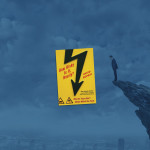Fear Can Rob Us of a Full and Meaning-Filled Experiences.
Fear is and was one of our greatest survival tools. Since the dawn of man, fear has been the engine that drove our avoidance of the cataclysmic.
When considering the modern world, there’s never been a better time to be alive, but fear has evolved in our gut, or minds, and in popular culture to the extent that the very thing that has allowed us to survive is now robbing us of living fully.
Science tells us that most fears and logic don’t often cross paths in today’s world for several reasons:
First, our factual, number-driven responses cannot compete with our emotional responses. For example, you see on the local news that 2,000 people died in a flood in India – likely ignoring the story without giving it another thought. Then, seconds later, you see that a celebrity in her 30’s has died of an overdose. Without hesitation, you’re texting and tweeting everyone you know. Your response to a large number of deaths (2,000) is minimal, but the response to a single death of a celebrity is substantial. The reaction is emotional, likely driven by some vague connection (via film, or social media) you have with the celebrity. Which event is more tragic? Which event should you consider in your daily life – massive killer floods or a single overdose (you don’t even use drugs)? There’s a reason researchers call statistics “people with the tears dried off.”
Second, our brains fail to consider the effect of randomness – that is, the idea that something such as cancer clusters were simply random occurrences (as opposed to caused by a driver in the midst of the cluster). This one failure often accounts for over exaggerated fear AND vastly under estimates other deadly realities. Television and news reports, often seeking attention through sensationalism, exacerbate these errors in perception – making risk assessment difficult for the average person.
Third, humans often confuse absolute and relative risk with the nature and characteristics of an event actually happening. Activities that have certain profiles are seen as much more risky than they actually are. Characteristics that drive risk perception include: catastrophic potential (fatalities in large numbers), familiarity (unfamiliar risks = more fear), personal control (risk beyond your control = more fear), voluntariness (if we can’t choose = more fear), and children (fear increases with children) to name several. The point here is humans often fear things because of the outcome–no matter how minuscule the risk. This makes us, as one researcher put it, “fantastically stupid” when it comes to assessing risk and managing fear.
Fourth, humans also have a hard time with large numbers. Not sure, check the concern of the average person about our national debt. If you’re still not sure, consider the water supply. Suppose you learn that there is some drinking water that contains three parts arsenic per billion. If you don’t understand the number one billion, you cannot rely on your mind to guide you. You’re left with your gut – which has no more information for you. But, the word arsenic has been introduced into the decision, so you press the panic button.
In the end, without the proper information, research, and mind-set, risk and the resulting fear that is created is often concocted by ignorance, the human condition, and the tsunami of sensationalism coming from media sources. In short, it’s a steaming pile of you know what.
So, the next time you are afraid, take some time to do a bit of research. You might find that there is nothing factual driving your fears. And, that might just allow you to live a little more.




